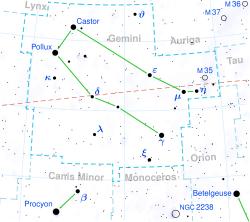ふたご座イオタ星
ふたご座の恒星
ふたご座ι星(ふたござイオタせい、ι Geminorum、ι Gem)は、ふたご座にある4等星である[7]。年周視差に基づいて、太陽からの距離を計算すると、約136光年である[2][注 1]
| ふたご座ι星 ι Geminorum | ||
|---|---|---|
| 星座 | ふたご座 | |
| 見かけの等級 (mv) | 3.78[1] | |
| 位置 元期:J2000.0 | ||
| 赤経 (RA, α) | 07h 25m 43.5956409143s[2] | |
| 赤緯 (Dec, δ) | +27° 47′ 53.086950407″[2] | |
| 視線速度 (Rv) | 7.432 ± 0.0009 km/s[2] | |
| 固有運動 (μ) | 赤経: -122.060 ミリ秒/年[2] 赤緯: -85.133 ミリ秒/年[2] | |
| 年周視差 (π) | 24.0201 ± 0.1873ミリ秒[2] (誤差0.8%) | |
| 距離 | 136 ± 1 光年[注 1] (41.6 ± 0.3 パーセク[注 1]) | |
| 絶対等級 (MV) | 0.7[注 2] | |
ふたご座ι星の位置(赤丸)
| ||
| 物理的性質 | ||
| 半径 | 10 R☉[3] | |
| 質量 | 1.8 M☉[4] | |
| 表面重力 (log g) | 2.59 cgs[5] | |
| 自転速度 | 0.0 km/s[3] | |
| スペクトル分類 | G9 IIIb[2] | |
| 光度 | 48 L☉[3] | |
| 有効温度 (Teff) | 4,785 K[5] | |
| 色指数 (B-V) | 1.024[1] | |
| 色指数 (V-I) | 1.01[1] | |
| 金属量[Fe/H] | -0.11[5] | |
| 年齢 | 4.16 ± 2.54 ×109 年[6] | |
| 他のカタログでの名称 | ||
| ふたご座60番星, BD+28 1385, FK5 282, HD 58207, HIP 36046, HR 2821, IRC +30183, SAO 79374[2] | ||
| ■Template (■ノート ■解説) ■Project | ||
特徴 編集
ふたご座の姿の中で、カストルとポルックスの中間に位置しており、4等星としては目立つ存在である[7]。ふたご座の1等星ポルックスと似た特徴の黄色巨星で、スペクトル型はG9 IIIbと分類される[7][2]。進化して主系列を離れ、レッドクランプ星にいたっており、ヘリウム核燃焼を起こしているものと推測される[7][4]。表面の有効温度はおよそ4800 Kで、半径は太陽の10倍、質量は太陽の1.8倍程度とみられる[5][3][4]。
名称 編集
中国では、ふたご座τ星は五諸侯(拼音: )という星官を、ふたご座θ星、ふたご座τ星、ふたご座υ星、ふたご座φ星と共に形成する[8]。ふたご座ι星自身は、五諸侯三(拼音: )つまり五諸侯の3番星と呼ばれる[8]。
アメリカのアマチュア博物学者アレンによると、ファンク&ワグナルズの“Standard Dictionary of the English Language”では固有名プロプス(Propus)がふたご座ι星のものになっているというが、実際にはプロプスは、ふたご座η星に付けられた固有名である[9][10]。
脚注 編集
注釈 編集
出典 編集
- ^ a b c ESA (1997), The HIPPARCOS and TYCHO catalogues. Astrometric and photometric star catalogues derived from the ESA HIPPARCOS Space Astrometry Mission, ESA SP Series, 1200, Noordwijk, Netherlands: ESA Publications Division, Bibcode: 1997ESASP1200.....E, ISBN 9290923997
- ^ a b c d e f g h i j “iot Gem -- Double or Multiple Star”. SIMBAD. CDS. 2024年1月25日閲覧。
- ^ a b c d Massarotti, Alessandro; et al. (2008-01), “Rotational and radial velocities for a sample of 761 HIPPARCOS giants and the role of binarity”, Astronomical Journal 135 (1): 209-231, Bibcode: 2008AJ....135..209M, doi:10.1088/0004-6256/135/1/209
- ^ a b c Tautvaišienė, G.; et al. (2010-12), “C, N and O abundances in red clump stars of the Milky Way”, Monthly Notices of the Royal Astronomical Society 409 (3): 1213-1219, Bibcode: 2010MNRAS.409.1213T, doi:10.1111/j.1365-2966.2010.17381.x
- ^ a b c d Sharma, Kaushal; Prugniel, Philippe; Singh, Harinder P. (2016-01), “New atmospheric parameters and spectral interpolator for the MILES cool stars”, Astronomy & Astrophysics 585: A64, Bibcode: 2016A&A...585A..64S, doi:10.1051/0004-6361/201526111
- ^ Soubiran, C.; et al. (2008-03), “Vertical distribution of Galactic disk stars. IV. AMR and AVR from clump giants”, Astronomy & Astrophysics 480 (1): 91-101, Bibcode: 2008A&A...480...91S, doi:10.1051/0004-6361:20078788
- ^ a b c d Kaler, James B. (2009年2月27日). “IOTA GEM (Iota Geminorum)”. Stars. University of Illinois. 2024年1月25日閲覧。
- ^ a b “中國古代的星象系統 (77): 井宿天區” (中国語). AEEA 天文教育資訊網. 國立自然科學博物館 (2006年7月16日). 2024年1月25日閲覧。
- ^ Allen, Richard Hinckley (1899). Star-names and their meanings. New York: G. E. Stechert. pp. 235-236
- ^ Kunitzsch, Paul; Smart, Tim (2006). A Dictionary of Modern Star Names. Cambridge, MA: Sky & Telescope. p. 39. ISBN 978-1-931559-44-7
関連項目 編集
外部リンク 編集
- iota Geminorum - Aladin Lite
